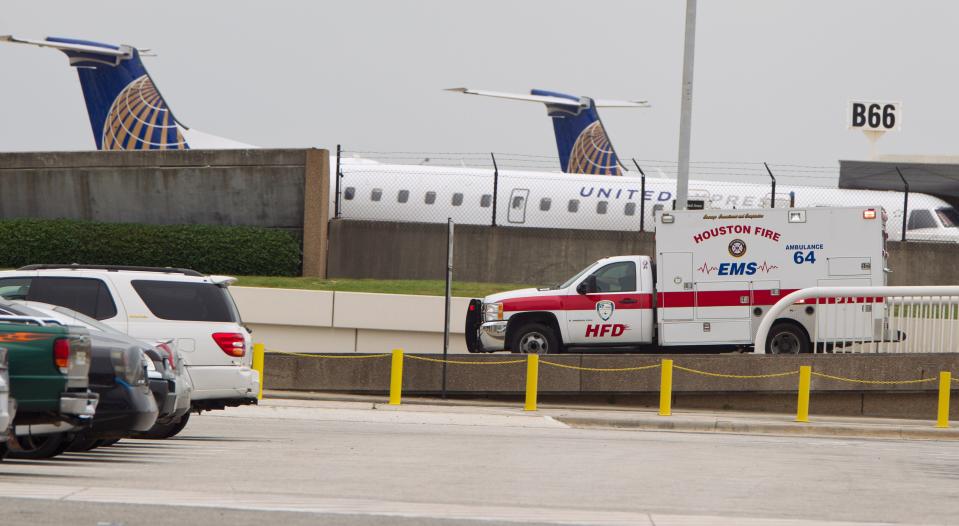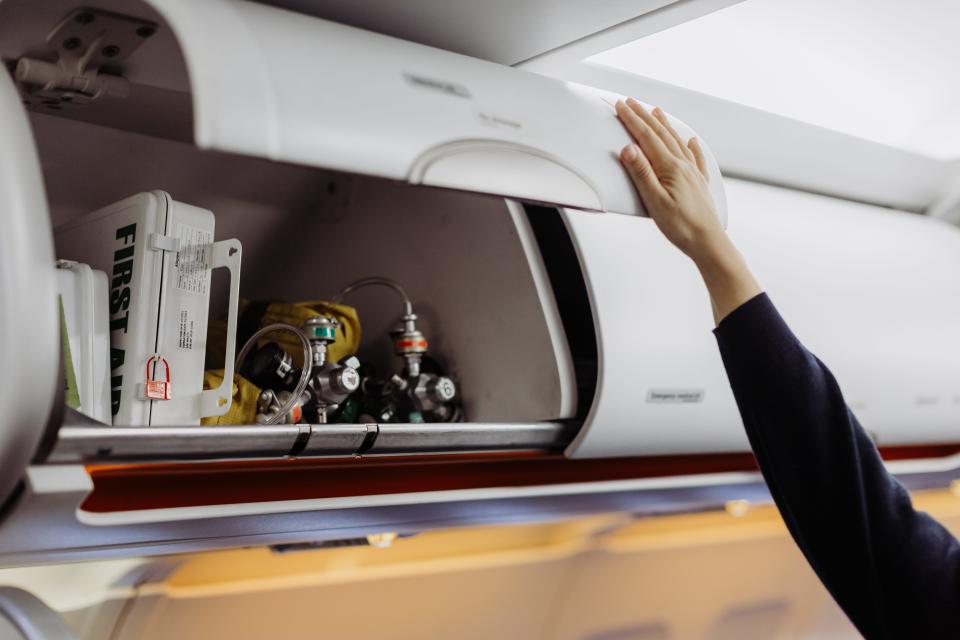Planes carry medical kits. Here's why you may not rely on them in an emergency.
"How to travel better" is a five-part series focusing on uncomfortable or inefficient travel experiences and how the industry can do better. If you'd like to contribute to our future reporting and share your experience as a source, you can fill out this quick form.
Linda Sbarra was in the middle of a 10-hour flight home from Greece via Italy with her husband and three kids in 2016 when she found herself struggling to breathe.
"I said 'Oh my gosh, I think I'm having a heart attack,' " the Port Jefferson, New York, resident told USA TODAY. "I didn't have chest pain, I just couldn't breathe."
Because her flight was over the Atlantic Ocean, Sbarra assumed that there was little that could be done to help her, so she didn't alert anyone other than her family to what was going on. She said she was determined just to make it home.
"Honestly, I spent the whole rest of the flight, it had to be a couple of hours watching ... that little plane moving across the screen," Sbarra said.

How cruises work for plus-size passengers: 'The worst part ... is getting on the flight'
Is travel insurance worth it?: What to know before you book your next trip
She went to the hospital when she was still struggling to catch her breath hours after getting home. Following a battery of tests, she learned she had a pulmonary embolism, likely caused by deep vein thrombosis, and her doctor told her she was lucky to be alive.
While it's true that dealing with a medical issue in flight can be complicated, experts say it's important to let flight attendants know as soon as possible if you're not feeling well. Even over the ocean, planes can divert in an emergency and all commercial aircraft are required to have some medical supplies on board.
The bigger problem, according to some, is that those required medical kits often contain low-quality equipment and don't always have everything necessary to address even some of the more common issues that happen in the air.

The medical equipment airplanes are required to carry
The Federal Aviation Administration sets minimum standards for the medical supplies required by airplanes operating in the U.S. These include "at least one" Food and Drug Administration-approved AED (automated external defibrillator) machine and a first aid kit stocked with supplies like alcohol wipes, gauze and bandages, a stethoscope, IV equipment and medicines like antihistamines and epinephrine.
However, advocates say, the FAA's requirements were last updated in 2006 and may not address some of the medical issues that are more likely to happen during a flight today, including drug overdoses.
"When was the last time we saw somebody bleeding on the airplane who needed a Band-Aid or gauze?" said Vance Hilderman, chief technical officer of AFuzion, an aviation safety consultancy. "They're there for show more than anything."
Story continues below.
Allegiant Air flight attendant Raychel Armstrong told USA TODAY that the supplies on board are often low quality even if they technically meet requirements.
"It's like things you would give to your children," she said, explaining, for example, that the stethoscopes she has seen on board are often poorly made and hard to use, and that other equipment is prone to breakage.
MedAire is one of the major airline medical kit manufacturers and advocates for updating the requirements as well.
"With advances in technology and the data from the in-flight cases since 2006, we have recommended additional items be introduced while other items can be removed," Paulo Alves, global medical director for aviation health at MedAire said in a statement to USA TODAY. "Even though the regulations have gone unchanged since 2006, it is essential to say most airlines in the United States have taken our recommendations and already carry onboard medical kits with medications above and beyond the minimum requirements."
Armstrong, who is also a representative for Allegiant's flight attendant union, said she once witnessed a passenger die on one of her flights and said unreliable medical equipment seems to have contributed to that outcome.
"They couldn't even get a needle in him because they just kept breaking," she said. "It’s traumatizing for the doctor and the nurse who are working on these people because they can’t give them the care they need," not to mention the flight attendants who are helpless to do more.
One doctor gained attention on Twitter in June after posting that the medical kit on her Delta Air Lines flight was insufficient for an emergency she was called to help with.
"Dear @Delta, I just assisted in a medical emergency in the air," she tweeted. "Your medical kits need a glucometer, epi pen, and automatic blood pressure cuffs- it’s impossible to hear with a disposable stethoscope in the air. Please improve this for passenger safety!"
Dear @Delta, I just assisted in a medical emergency in the air. Your medical kits need a glucometer, epi pen, and automatic blood pressure cuffs- it’s impossible to hear with a disposable stethoscope in the air. Please improve this for passenger safety!
— Dr. Andrea Merrill (@AndreaLMerrill) June 12, 2022
She later posted that the airline said it would update some of its equipment based on her feedback.
How travelers can find out what medical equipment will be stocked on their flight
Airlines can – and often do – stock more than the minimum equipment on their planes, but information about what's available on individual flights or carriers can be hard to find.
"A passenger could do a little bit of research," if a well-stocked first aid kit is important to them, Hilderman said, but a quick search by USA TODAY failed to turn up comprehensive information about the exact supplies on some of the biggest airlines in the U.S.
Sbarra said she may have been more likely to alert a flight attendant about her breathing issue if she'd known the plane was stocked with an AED, or even if she'd had the presence of mind to ask for medicine.
I got COVID while traveling: Here's what I wish I knew (and what I needed) to go back home
I took a CO2 detector on a flight: It showed me when I was most likely exposed to COVID
"I could have taken an aspirin if I had been thinking clearer," she said. "I think it’s a good idea for people, in general, to know what they have."
But, Armstrong said, there can be a good reason not to advertise exactly what's in the medical kit too widely.
"People would just rely on it because they believe it’s free," she said. "I’ve had a passenger board saying, 'I need oxygen but I don’t have it. It's fine though, I'll just use yours.' "
How advocates say airplane medical kits can be improved
Aside from encouraging airlines to stock higher-quality equipment under the current standards, Armstrong and Hilderman said the FAA should update its requirements to address some of the medical emergencies that have become more common since 2006, as MedAire has been advocating.
"I feel like we're out camping in the middle of the woods and we just have a first aid kit. You're on your own and hopefully, you can figure it out." Armstrong said. "We don't have a pulse oximeter ... It would be great if we had a glucose meter. Narcan would be great. I don't want to be a whole hospital," but flight attendants should have options on board.
Medical tourism: Why more people are traveling abroad for cosmetic surgery
"Ammonia inhalants are required on all flights, but current medical literature lacks evidence to support their use. The same applies to atropine – used to treat the symptoms of low heart rate – which is required in the Emergency Medical Kit, but treating low heart rate in flight is very rare," said Alves from MedAire. "On the other hand, there is no requirement for an anti-emetic (vomit) drug, although it is relatively common in flight. Our data also shows an anti-convulsant would be helpful during long routes over water or areas where diversion is impossible."
Hilderman added that increased training could also help flight crews respond to emergencies more quickly and comprehensively.
"Could we have a registered nurse on board? Could one flight attendant receive more training and more money?" he said.
What other passengers can do if a medical emergency happens on their flight
Given the current training and medical kit limitations, flight attendants often need to ask for assistance from professionally-qualified passengers when medical emergencies occur. But, Armstrong said, it's not only doctors who can help make things easier for the patients and crews.
During a medical emergency is definitely not the time for other passengers to ask for a drink or try to go to the bathroom, but beyond staying in your seat, Armstrong said, it's important to be ready to help when asked.
All passengers should look out for each other and notify the crew if something seems off. But, she acknowledged, it can be frustrating to feel like passengers need to take on extra responsibility.
"I don't want it to be all on the passengers either. That's the frustrating thing. I want to have better equipment for us, I want us to have better training to react to these situations," Armstrong said. "I've never had to put a needle into somebody to do an IV. I could figure it out, but I’m not going to be able to do it as easily as a registered nurse or a doctor."
Depending on the situation, passengers could need immediate medical attention beyond what flight attendants are trained to do.
Those who are qualified and do offer to assist during an in-flight emergency are protected from liability under Good Samaritan laws.
For her part, Sbarra, who had a pulmonary embolism during a flight in 2016, said she's still wary about long-haul flying now, but would be more proactive about alerting a flight attendant to any health issues in the future.
"I almost didn't want to bother anyone. Everyone needs to get back to where they're going," she said. "Now knowing, I definitely would say something."
Have you had a medical emergency while traveling? What happened?
This article originally appeared on USA TODAY: Airplane medical kits are in need of an update. Here's why.

